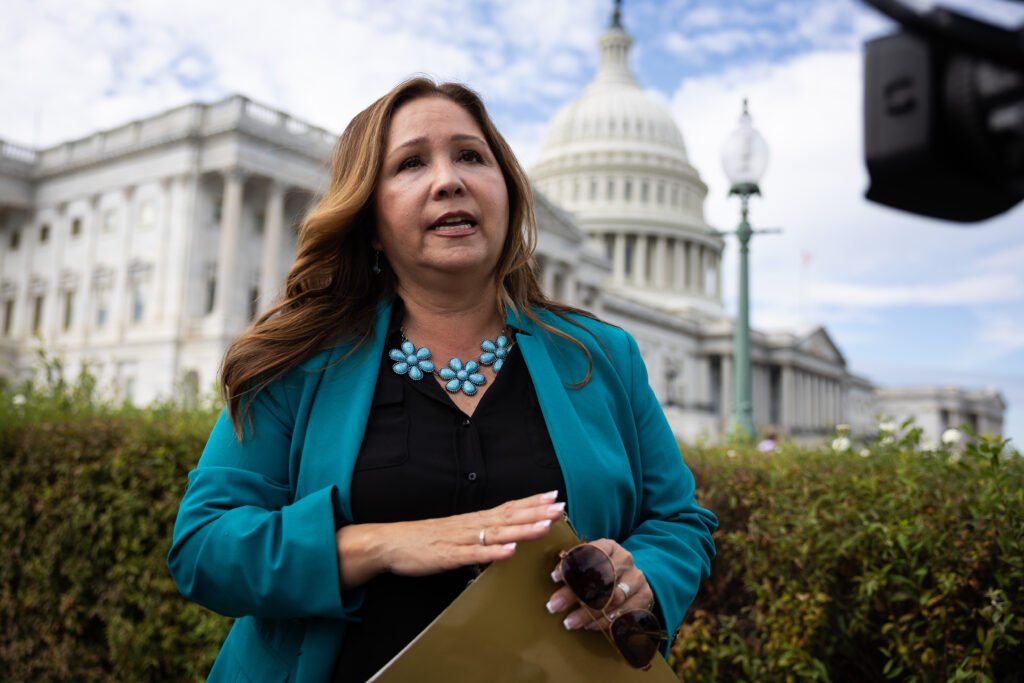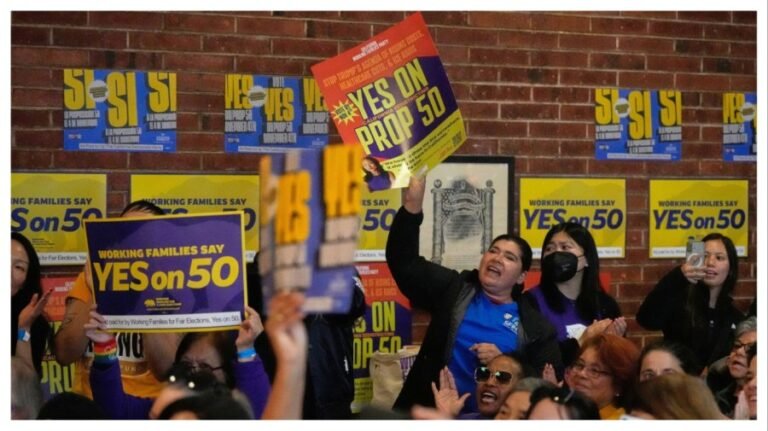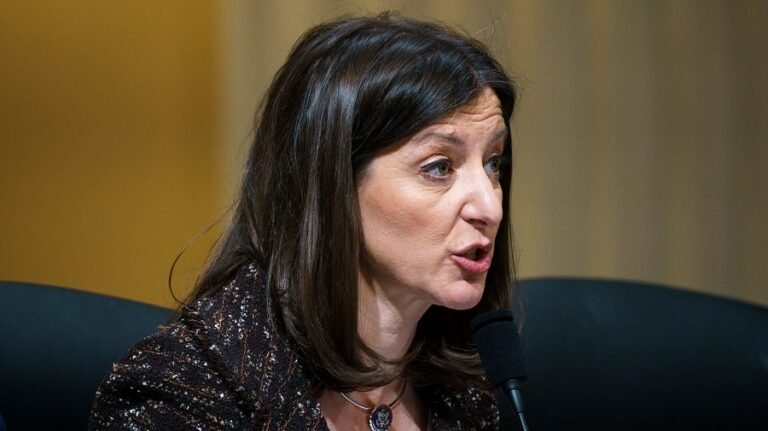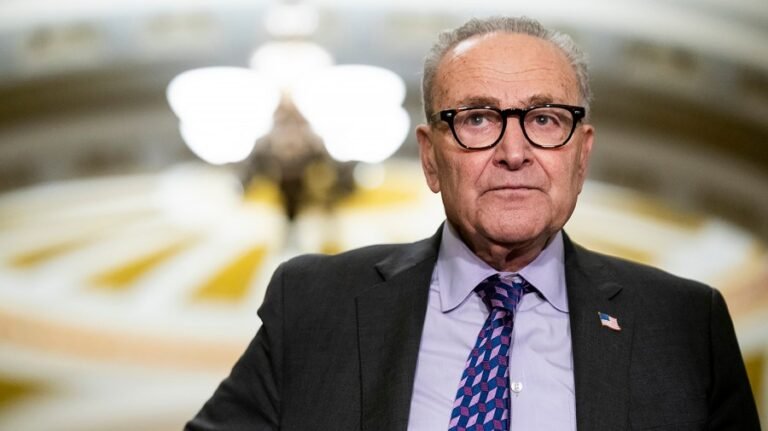
The monthslong bipartisan effort to sidestep Speaker Mike Johnson and force the release of all Justice Department files on the late sex trafficker Jeffrey Epstein is kicking into high gear this week, setting up a December floor battle that President Donald Trump has sought to avoid.
The cascade of action is set to begin Wednesday evening, when Johnson will swear in Rep.-elect Adelita Grijalva right before the House votes to end the government shutdown, ending a 50-day wait following the Arizona Democrat’s election. Shortly afterward, Grijalva says she will affix the 218th and final signature to the discharge petition led by Reps. Thomas Massie (R-Ky.) and Ro Khanna (D-Calif.) to force a vote on the full release of DOJ’s Epstein files.
That in itself will be the culmination of months of drama that blew up into a full crisis for Johnson this summer, with a GOP mutiny grinding the floor to a halt and forcing leaders to send the House home early for August recess. The uproar over a possible Epstein cover-up faded but never disappeared entirely.
The completion of the discharge petition, a rarely used mechanism to sidestep the majority party leadership, will trigger a countdown for the bill to hit the House floor. It will still take seven legislative days for the petition to ripen, after which Johnson will have two legislative days to schedule a vote. Senior Republican and Democratic aides estimate a floor vote will come the first week of December, after the Thanksgiving recess.
The discharge petition tees up a “rule,” a procedural measure setting the terms of debate for the Epstein bill’s consideration on the House floor. This gives the effort’s leaders greater control over the bill, which will still require Senate approval if it passes the House.
Senate Republican leaders haven’t publicly committed to bringing up the Epstein measure if the House passes it. Republicans expect it will die in the Senate, but not before a contentious House fight.
While Johnson has options to short-circuit the effort before it gets to the floor, he said in an interview last month he would not seek to do so. Republicans on the Rules Committee have also warned Johnson they will not help him kill the bill in the panel, and he’s in turn privately assured some of them the Epstein measure will get floor consideration if the petition reaches 218 signatures.
At that point, the speaker can only defeat it if he siphons away enough Republican votes — a tall order in a majority where Johnson has only a two-vote margin after Grijalva is sworn in.
“I’m certain the House vote will succeed,” Massie said in an interview. “Some Republican members who are not signers of the petition have told me they will vote for the measure when the vote is called. I suspect there will be many more.”
He added, “I even wonder if Speaker Johnson might advise politically vulnerable members to vote for it.”
GOP leadership circles estimate several dozen Republicans are considering backing the effort on the floor, even after Trump officials convinced several hard-liners to keep their signature off the discharge petition.
Republicans and Democrats are closely watching three GOP women who made the rare move to buck party leadership and sign onto Massie’s effort. Reps. Lauren Boebert of Colorado, Marjorie Taylor Greene of Georgia and Nancy Mace of South Carolina are still supportive of the measure, despite an intense pressure campaign by White House officials and senior Republicans in recent months to undercut Massie’s push.
“They’re all still on board,” Massie said.
But Trump has repeatedly tried to downplay the Epstein matter as a “Democratic hoax” and blasted Republicans on Capitol Hill and even his own voters for exacerbating the controversy about the files. He claimed in September the Justice Department had already “done its job” and released all the information it could.
Massie predicted a “last, desperate effort” from Trump officials to undercut the discharge petition. “But I expect that effort to fail,” he said.
“Even if one signer were to remove their name, there will be another member showing up later that will get us to 218,” Massie added, referring to a December special election in a safe Democratic seat in Texas. ”All that matters is we reach 218.”
Johnson in recent weeks has pivoted to trying to convince House Republicans to oppose the measure once it comes to the floor.
“The bipartisan House Oversight Committee is already accomplishing what the discharge petition, that gambit, sought — and much more,” Johnson said at a news conference last month.
All “credible information” would be released to the public as part of the panel’s monthslong probe into the matter, he said, while precautions are taken to protect Epstein’s accusers.
House GOP leadership has pointed to the Oversight Committee probe to argue that the effort led by Massie is unnecessary. The panel issued a subpoena to the Justice Department for materials related to Epstein’s case in August, and the administration has begun handing them over.
But the investigation, led by Oversight Chair James Comer (R-Ky.), has hit some roadblocks, too.
The Justice Department said earlier in the shutdown that it would resume cooperation with the House investigation only after Congress votes to reopen the government. As a result, the department has submitted few additional materials to congressional investigators since the probe began.
The Oversight Committee has turned to Epstein’s estate for a number of documents and materials, including the so-called “birthday book” that included a note apparently signed by Trump celebrating Epstein’s 50th. Trump denies drafting the letter and has sued the Wall Street Journal, which was first to report on its existence.
Despite the president’s apparent inclusion in the book, GOP lawmakers have argued the results of the Oversight probe exonerate Trump from wrongdoing. Still, Democrats have sought to stoke division among the president’s base by arguing his administration was slow-walking the release of information as part of a larger conspiracy.
The issue is likely to be a persistent headache for the GOP in the coming months. Epstein co-conspirator Ghislaine Maxwell, who sat for an interview with Deputy Attorney General Todd Blanche in July, is preparing a commutation application for the administration to consider.
Trump has declined to rule out any sort of reprieve for Maxwell, a convicted sex offender now serving a 20-year sentence. Johnson said in a recent interview with Piers Morgan that he did not support a pardon.


